- Home
- Mark Wayne McGinnis
The Hidden Ship
The Hidden Ship Read online
THe
Hidden
Ship
Mark Wayne McGinnis
Contents
prologue
chapter 1
chapter 2
chapter 3
chapter 4
chapter 5
chapter 6
chapter 7
chapter 8
chapter 9
chapter 10
chapter 11
chapter 12
chapter 13
chapter 14
chapter 15
chapter 16
chapter 17
chapter 18
chapter 19
chapter 20
chapter 21
chapter 22
chapter 23
chapter 24
chapter 25
chapter 26
chapter 27
chapter 28
chapter 29
chapter 30
chapter 31
chapter 32
chapter 33
chapter 34
chapter 35
chapter 36
chapter 37
chapter 38
chapter 39
chapter 40
chapter 41
chapter 42
chapter 43
chapter 44
chapter 45
chapter 46
chapter 47
chapter 48
chapter 49
chapter 50
epilogue
Acknowledgments
Other Books by MWM
Copyright
prologue
There are a number of outlying buildings on my family’s property; a massive barn, a bunkhouse once occupied by a team of ranch-hands, and several long and narrow chicken coops. The house itself is large, far too big for a single occupant—me. Hell, this sprawling ranch-style structure has no less than six fireplaces, twelve bedrooms, a ridiculously huge ballroom, a library, and a kitchen larger than those found in most hotels.
Unless you knew exactly where to find the concealed room, and the specifics on how to access it, you wouldn’t come across it—not on your own, anyway. Family members as far back as 1919 searched the grounds for the subterranean vault hidden somewhere in the house. You see, my great-great-grandfather, Robert Polk, a prominent and successful Colorado cattle rancher at the time, was no fan of the 1918 Volstead Act, more commonly known as Prohibition. Back then, the local constable, along with a team of police, searched for the vault where it was well known Robert was storing illegal stockpiles of liquor. Far more recently, Earth’s alien occupying invaders also searched for it. Neither ever found it.
I now sat in the voluminous, not to mention dank and musky, vault sipping my eighty-five-year-old scotch from one of Robert Polk’s fine cut-crystal tumblers. Only a single flame flickered within a lone gas lantern in the muted darkness. The vault was so large, only the nearest of the room’s four interior walls was visible beyond the lantern’s limited glow. Three thousand square feet of space that once contained hundreds of oaken barrels of liquor, stacked up to the rafters now contained a different sort of contraband. Military surplus supplies of every kind from all over the world were packed inside a significant cache of stacked crates. That contained a broad assortment of both new and used war supplies. Everything from pull-pin grenades, to night-optics headgear, to never used M-16 fully automatic rifles. Even laser-guided missile launchers. An arsenal of weaponry and ammunition that took me years to assemble. Procuring each piece had become so time consuming, along with my other, also highly deviant activities, that I had little time to do much of anything else.
Sitting at a wood plank table, I powered-up on my circa 1950s RCA vintage Ham radio transmitter and waited for the old glass tubes to sufficiently warm up. A minute later, I spun the dial up to the high 9,000 kHz range. Slowing through the frequencies, I heard ghostly clicks and sounds of static. Then I heard his far-away sounding, heavily accented words.
“Polybius . . . are you there? Hello, hello?” This is your friend . . . this is Sopravvissuto. Hello, hello . . .”
I smiled, hearing the old man’s voice. Sopravvissuto, his code name, was Italian for survivor. An eighty-three-year old, he walked with a cane and owned a small corner grocery store somewhere in northern Italy. Specific locations were never used over the air, just as our actual names were never spoken aloud.
“Good morning, Sopravvissuto . . . I trust you slept well?” I asked. Now was our prearranged day and time to reach out to one another—about 9:00 p.m. in Colorado, and around 5:00 a.m. in Italy.
I silently listened to an extended pause—fluctuating background noise became an ominous precursor to his next words.
“To be honest, I am scared, my friend, even more so than usual. My daughter . . . lives nearby, in a town about sixty kilometers away called—”
I keyed my mic—“Don’t say the name! No names, Sopravvissuto. They may be listening . . . Please, be careful.”
“Yes . . . yes, thank you.” Following another long pause, he said, “Polybius . . . I cannot reach her by telephone. Three days now. Neither can I reach others who live in that same northern Italian town. Not one person. The phones ring and ring, but no one answers.”
Today was not the first day I’d heard news regarding that same Italian village. Other rebels, like Sopravvissuto and me, from all around the world spoke of a town in Italy that seemingly no longer existed. Only through shortwave and Ham radios were such illicit communications even possible. Cell phones were a thing of the past. The internet was long gone. Landline telephones were operational for the most part, but often monitored. I knew even this—transmitting by shortwave radio—might not be safe. I’d constructed a shortwave radio antenna some two hundred yards from the house; screened from sight within thick branches of towering oaks flanking both sides of my long driveway. But now radio tubes fitting my old radio were nearly impossible to find these days. Even worse, they were burning out more and more quickly lately.
“Sopravvissuto . . . I’m sure there is a good explanation. Perhaps the antenna was discovered, or a cable was severed. Do not lose faith, good friend.” I tried to sound upbeat, even though in my heart I knew the situation in Italy was dire. His daughter had probably been killed. The alien invaders were beyond ruthless. But a whole town being eliminated was most alarming.
chapter 1
I turned onto Plum Creek Road and found three mounted lizards smiling back at me from the side of the road. The billboard, relatively new, had a nostalgic quality to it—reminded me of the old 1960s’ TV show, Bonanza, where the characters, Ben, Little Joe, and Hoss, galloped across the plains of the Ponderosa on horseback. That fond image had been replaced with three Reptilian Gaps, wearing chaps, spurs, and oversized cowboy hats. The same questions arose—for me as they did for everyone else—why were the invaders here? What did they want from us?
It was still early enough that I had no trouble finding an open parking spot right out front of the greasy spoon, called the B&B.
I shut off the engine and climbed out, avoiding my three-year-old bloodhound’s melancholy stare. Leaving the pickup’s driver side and passenger side windows wide open, I scolded, “Don’t be so dramatic,” then stood there, feeling guilty anyway. My life shouldn’t revolve around the emotions of a damn dog. “You want scraps, Mort? Best I don’t hear any barking coming from this truck.”
Pocketing the old Ford’s keys, I headed for the entrance. Proprietors were busy decorating their storefronts
. All major streets were already adorned with flags and banners depicting the annual Friends Unite Day in bright colors of orange, purple, and brown. A god-awful combination nobody quite understood, but went along with, since they had little choice but to do so. Tomorrow, the festivities would begin: an afternoon parade marching right down Wilcox, then the Friends Unite Day Carnival held at Castle Rock’s fairgrounds. Throngs of people would attend. Was it mandatory? No. But missing it was the sort of thing that could get you noticed as one who could possibly be a dissident, someone non-compliant with the dictums of the new order. Yes, tomorrow was supposed to be a day of celebration—the two-year anniversary when everything on Earth changed. When, in truth, virtually every man, woman, and child would inwardly mourn the loss of someone—those taken from them that fateful night. But sure, we would wear our forced smiles and try to act jovial, as if nothing had changed. Life as usual. It was only by sheer chance that the invasion took place one week after the 4th of July. Now orange, purple, and brown flags replaced America’s patriotic, and now forbidden, red, white, and blue flags.
A tiny overhead bell chimed as I stepped inside. Murmured voices suddenly quieted—eyes from the fifteen or so seated patrons rested upon me for several long beats. It was a routine reaction. Something we all tended to do in these volatile times. Being careful was the new norm. I spotted Donny and Matt in a nearby booth. Three booths further on, I made eye contact with Ronald Gant. One would think the only real foe around here were the obtrusive alien invaders who had so abruptly shattered everyone’s lives here in America, and across the entire world. Just as they had right here in what was once a good and decent small town. But there was another enemy, perhaps one even more insidious, living among us: those fully embracing the enemy and their forced lifestyle changes and mandates. They have become—more or less—one of them. They sided with the aliens rather than uphold the very survival of the Human race. Ronald Gant was one such person. Once neighbor, friend, and someone I would have gone far beyond the extra mile for, was now one of my worst nemeses. The chief problem was that he was methodically bringing other Humans around to his sordid way of thinking. A kind of if you can’t beat them, join them, philosophy. Ronald Gant was the founder of the Friends For Friends directive, a new neighborhood watch program. A gang of men and women who twice weekly held meetings and scheduled either late evening or early morning patrols. Its sole purpose was to keep any and all subversion out of Castle Rock. Sure, their reasoning was compelling; how many more decent people had to go missing, be tortured, and even executed, before something was done? The problem with their way of thinking was that someday you’re going to want your freedom back. You’re going to wake up and realize that hardship, even death, is the price one may have to pay for freedom. Ronald Gant and I were on opposite sides of that debate. Sooner or later, there would be a reckoning.
“Coffee, Brian?” Wendy asked, standing behind the cash register.
I answered with both a nod and a wink as I slid in beside Matt.
“You look like shit,” Donny said.
“Good morning to you too, asshole.” I retorted, reaching for a menu wedged in behind the condiments caddy.
“You’ve been coming here your whole damn life . . . what are you going to see on that menu that you haven’t seen a thousand times before?” Donny asked. “And you always order the same thing, anyway,” he continued. “Oatmeal and a side of bacon.”
I gave Donny a sideways glance. Donny Kuruk was my best friend. Just a tad over six feet, his dark hair and dark complexion bespoke his Apache Native American heritage. Like me, he, too, was tall, broad-shouldered, and muscular from his in the military. Multiple tours fighting in hellish places like Helmand, Kandahar, and Logar Province. While Donny had battled on the ground as a Marine, I, Captain Brian Polk, had flown jets—piloting U.S. Air Force F-16 Fighting Falcons. We both grew up in Castle Rock, a bit more than a thirty-minute-drive south of downtown Denver. Once back stateside, three and a half years ago, I was teaching history three days a week at Colorado University, in Denver. That was back when Denver was an actual municipality, not a bombed-out shell of a city.
“Well, today might be different,” I said, still perusing the menu. “Never know, maybe I’ll surprise you. Get scrambled eggs, or maybe a short stack.”
Wendy arrived at our booth, not bothering to pull the notepad from her back pocket. “Usual all around?” she asked, her neatly penciled brows raised high. She shot a quick warning glance at Donny, who smiled up at her.
“So help me, you start that grab-ass shit today and I’ll punch you in the face. I swear to God, Donny, I’m in no mood for it.”
Donny raised his hands in mock surrender. “Hey, I’m just here for the huevos rancheros.” He shook his head, looking dismayed, but then added, “Look, calm down . . . you’re like old enough to be my mother.”
“Oh, screw you,” Wendy shot back, looking ready to kill him.
I held back a laugh; I knew she wasn’t more than a few years older than him, at thirty-two. She turned her attention to Matt. “Breakfast burrito, hon?”
“Yeah . . . and bring me a Coke, too.”
“You got it.” She abruptly spun away, not bothering to take Donny’s or my order. Wendy knew what we wanted. No different today than yesterday, or the day before that.
I looked over at Matt, also ex-military, but six inches shorter and a good fifty pounds lighter than either Donny or me. Balding on the top of his head, he was the quiet one of our trio. He returned home from his last tour of duty missing one leg, although no one would suspect he wore a leg prosthesis by the agile way he got around. He’d been in the Army EOD: Explosive Ordinance Disposal. But the loss of his leg didn’t occur while doing his job, but in the course of taking a crap—somewhere in Kandahar province. He didn’t like talking about it.
“You see the ‘Friends Fucking Friends’ breakfast club gang?” Matt asked.
I nodded back, not caring to get into it now.
“Tell me you’ve made some progress. Time is running out,” Donny said, in a hushed voice.
I blew out a breath. “Hey, you want me to take a wrench to an F-16’s Pratt & Whitney power plant, no problem. But this isn’t that. This thing . . . defies the friggin’ laws of physics!”
“Okay, okay . . . keep your voice down,” Matt interjected. “He was just asking. We have a strict timetable, so we’re all uptight.”
“Well, it doesn’t help knowing we’re constantly being watched and followed,” I said, gesturing with a jerk of my chin toward the group of men sitting three booths away.
Just then the little bell above the café door chimed, then chimed again. The patrons quieted, everyone looking over to see who was entering the establishment. This time a pregnant silence prevailed as three beings entered. Their heavy footfalls made the old oaken floorboards beneath them creak. I put a smile on my face that didn’t reach my eyes. Donny and Matt, plus everyone else in the B&B, nodded back. They were the EMS—Earupitan Marshal Service. The alien version of the Gestapo. All three still had what Humans referred to as their ear pucks still activated. About the same size and shape as a typical hockey puck—they’re metallic with series of intricate concentric rings and tiny blue lights that flickered on and off seemingly at random. The ear pucks were amazing technology—for one thing, they seemed to defy gravity. Bring the device up anywhere close to one’s head, let go of it, and it seems to know precisely where to go—to lock onto the location of a Gap’s ear and position itself right above it—hover there all on its own. The apparatus was multi-functional—first being a kind of EMS communications device. Second, it can be activated to provide a virtual 3D heads up display that encompasses the Gap’s head and shoulders where eye movements are tracked—and used to make virtual menu selections and so on. And thirdly, the ear pucks can be used as a kind of 360-degree energy shield for a Gap’s head and upper torso. All in all, the devices were amazing tech.
Each of the three Gaps took this opportunity to remove their ear pucks and place them into their pants pockets.
“Morning guys!” Wendy said, from behind the register.
The three Gaps headed for the counter, where the seating would better accommodate their substantial girth. Before taking a seat, one of them glanced our way. Nodding, he tipped the brim of his Stetson cowboy hat, in a howdy-there folksy gesture. I followed suit, tipping down the brim of my own baseball cap. Each of the alien marshals wore gunslinger-style, holster belt rigs, only they weren’t armed with old six-shooters. Instead, they were armed with what today was commonly referred to as a mistmaker—because any area of someone’s body struck by a mistmaker’s energy bolt, instantly vaporized—turned to bloody mist. I watched as the three, seven-foot-tall aliens shuffled about, getting their ungainly legs situated somewhat comfortably into the limited space beneath the counter top. I stopped myself from shaking my head in wonder. Why they felt compelled to always wear Americana western garb, I had no clue. Like Trekkies attending a Star Trek convention where everyone dressed-up like Bones, Spock, and Captain Kirk, these three lizardy guys were excited to dress up like Roy Rogers and the Lone Ranger. They wore oversized blue jeans, cowboy boots, and different, brightly colored—red, blue, or green—long-sleeve, snap-button shirts with embroidered swirls on their collars. All three wore cowboy hats that didn’t quite fit their oblong, lizard-shaped, heads. I silently wondered what the Gap invaders were now wearing in Moscow, or Vienna, or Mexico City. I tried to mentally picture a Gap lizard wearing an oversized sombrero. It was almost laughable, how hard they tried to meld into their preconceived slant of local cultures around the world. But if they really wanted to be accepted, maybe they should stop interrogating, torturing, and killing so many of the Human masses.
I watched as Wendy sauntered up before them, her notepad and pen poised to take their order. Making a mistake, while either taking their order, or when preparing it, could cost her her life. “What’ll you have, boys?” she asked, playing up to their TV cowboy personas.

 The Hidden Ship
The Hidden Ship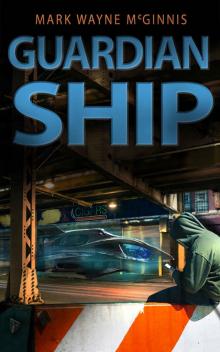 Guardian Ship
Guardian Ship Cloudwalkers
Cloudwalkers Mad Powers (Tapped In)
Mad Powers (Tapped In) Ship Wrecked
Ship Wrecked The Great Space (Scrapyard Ship Book 6)
The Great Space (Scrapyard Ship Book 6) Ricket (Star Watch Book 2)
Ricket (Star Watch Book 2)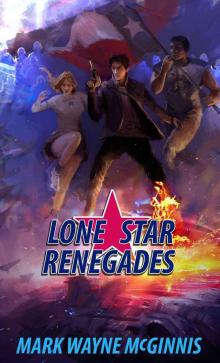 Lone Star Renegades
Lone Star Renegades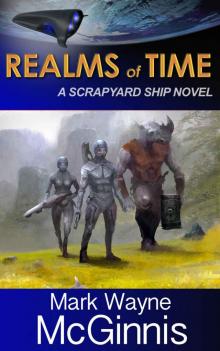 Realms of Time (Scrapyard Ship)
Realms of Time (Scrapyard Ship) Glory for Sea and Space (Star Watch Book 4)
Glory for Sea and Space (Star Watch Book 4) Scrapyard Ship 3 Space Vengeance
Scrapyard Ship 3 Space Vengeance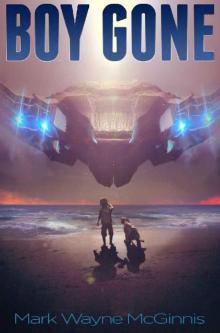 Boy Gone
Boy Gone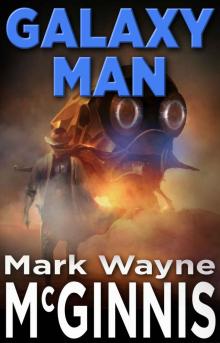 Galaxy Man
Galaxy Man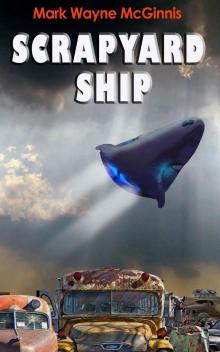 Scrapyard Ship
Scrapyard Ship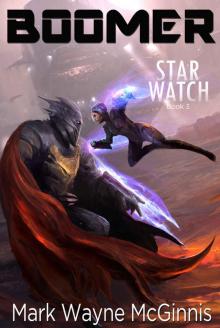 Boomer (Star Watch Book 3)
Boomer (Star Watch Book 3)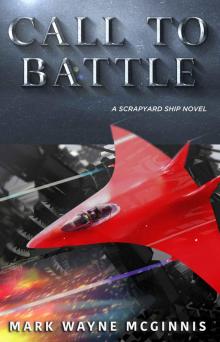 Scrapyard Ship 7: Call to Battle
Scrapyard Ship 7: Call to Battle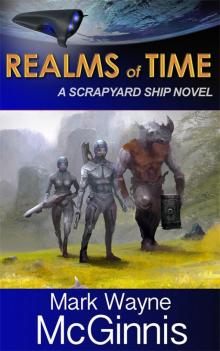 Scrapyard Ship 4 Realms of Time
Scrapyard Ship 4 Realms of Time Star Watch
Star Watch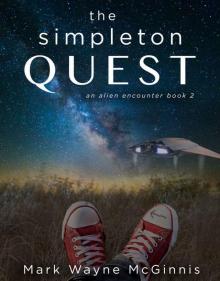 The Simpleton QUEST
The Simpleton QUEST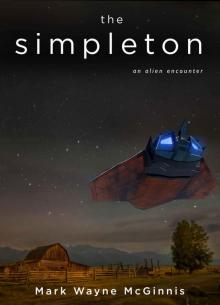 The Simpleton: An Alien Encounter
The Simpleton: An Alien Encounter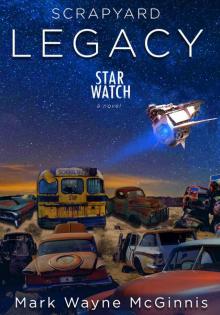 Scrapyard LEGACY (Star Watch Book 6)
Scrapyard LEGACY (Star Watch Book 6) Ship Wrecked: Stranded on an alien world
Ship Wrecked: Stranded on an alien world